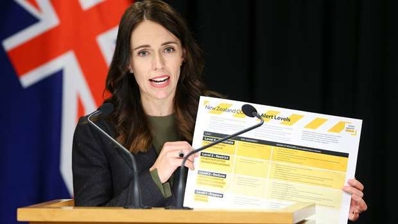Auckland put into Alert Level 3 lockdown for 7 days, rest of NZ return to Alert Level 2

Auckland is being put into an Alert Level 3 lockdown and the rest of New Zealand will move to Alert Level 2 from 6am tomorrow morning, 28th February.
Prime Minister Jacinda Ardern said that she was advised about a Covid-19 new case in South Auckland this afternoon.
It was a family member of a student from Papatoetoe High School. That student had tested negative 3 times before and had no known symptoms - that means there is no current link.
Genome testing is underway - and there is a strong assumption that it's from the current cluster.
But that cannot be confirmed yet.
She said there was a "cause for concern" as this person has been infectious for a week and not been in isolation.
Cabinet met this afternoon after the new case was detected.
That person had been to a number of "well-populated sites".
The latest case developed symptoms on Tuesday. "As a result, the person is regarded as being potentially infectious from Sunday 21 February."
They were tested on Friday and the positive result was received today.
Four new locations of interest
The Ministry of Health has released four new locations of interest tonight:
• Hunter Plaza (26 February) 2.55pm-5pm
• Burger King Highland Park (25 February) 8pm-9pm
• Your Health Pharmacy (23 February) 2.45pm-3.50pm
• Pak'nSave Manukau (21 February) 5.30pm-6.40pm
Anyone who visited these locations are to be considered a contact of a Covid case "out of an abundance of caution". No specific times have been mentioned by the Ministry so far.
Meanwhile a gym in Papatoetoe has been closed today after being told a person who has tested positive had visited twice, including on Friday.
This exact location has not been confirmed by health officials, but it is located in Hunter Plaza.
CityFitness Papatoetoe told members in an email tonight:
"We have been notified by Auckland Regional Public Health that a person who tested positive for Covid 19 visited our Papatoetoe location on the dates and times below."
Saturday Feb 20th – 12:20pm – 1:45pm
Friday Feb 26th – 3:20pm – 4:40 pm
"We have been advised the Auckland Regional Health Board will contact directly anyone who was in the gym during that time and designated as a "Close" or "Casual Plus" contact who should follow the steps below."
Health officials' focus remains on KFC in the Auckland suburb of Botany. A family member of one of the Papatoetoe High School students who tested positive had been told to stay home and isolate, but instead went to work at the fast-food restaurant on Monday.
The Ministry of Health said earlier today there were three categories of contacts related to KFC. Eleven people in the first category are close contacts plus who also worked there and are in 14-day isolation.
Members of the public who entered the store at the time are close contacts who must get tested today, and casual plus contacts who went the drive-thru should also get tested today. Both groups should isolate until receiving a negative result.
Yesterday Prime Minister Jacinda Ardern said she was, "like everyone, frustrated" about the person who went to work at KFC.
"We want people to do the right thing because that's what keeps everyone safe."
Despite this, she is warning against a "mass pile [on]" of the person in question, as that might create an environment where people are too afraid to get tested.
She is asking for everyone who may have come into contact with the new case to "do the right thing" and isolate.
And if they don't, she is sounding a warning: "There is a section 70 order".
That order means a medical officer of health can oblige people to isolate.
"We have some legal footing for that ... and so there are repercussions," Ardern said.
Earlier today, prior to the latest community case being revealed, there was only one Covid-19 case in managed isolation.
For more information visit covid19.govt.nz.
Rules for Alert Levels:
Alert Level 4 — Lockdown
Likely that the disease is not contained and community transmission is occurring.
• Range of measures that can be applied locally or nationally
• People instructed to stay at home in their bubble other than for essential personal movement.
• Safe recreational activity is allowed in the local area.
• Travel is severely limited.
• All gatherings cancelled and all public venues closed.
• Businesses closed except for essential services, such as supermarkets, pharmacies, clinics, petrol stations and lifeline utilities.
• Educational facilities closed.
• Rationing of supplies and requisitioning of facilities possible.
• Reprioritisation of healthcare services.
Alert Level 3 — Restrict
Community transmission might be happening.
• Range of measures that can be applied locally or nationally.
• People instructed to stay home in their bubble other than for essential personal movement — including to go to work, school if they have to or for local recreation.
• Physical distancing of 2 metres outside home including on public transport, or 1 metre in controlled environments like schools and workplaces.
• Bubbles must stay within their immediate household bubble but can expand this to reconnect with close family/whānau, or bring in caregivers or support isolated people. This extended bubble should remain exclusive.
• Schools between years 1 to 10 and Early Childhood Education centres can safely open but will have limited capacity. Children should learn at home if possible.
• People must work from home unless that is not possible.
• Businesses can open premises, but cannot physically interact with customers.
• Low-risk local recreation activities are allowed.
• Public venues are closed. This includes libraries, museums, cinemas, food courts, gyms, pools, playgrounds, markets.
• Gatherings of up to 10 people are allowed but only for wedding services, funerals and tangihanga. Physical distancing and public health measures must be maintained.
• Healthcare services use virtual, non-contact consultations where possible.
• Inter-regional travel is highly limited to, for example, essential workers, with limited exemptions for others.
• People at high risk of severe illness such as older people and those with existing medical conditions are encouraged to stay at home where possible, and take additional precautions when leaving home. They may choose to work.
Alert Level 2 — Reduce
The disease is contained, but the risk of community transmission remains. Risk assessment. Household transmission could be occurring. Single or isolated cluster outbreaks.
• People can reconnect with friends and family, and socialise in groups of up to 100, go shopping or travel domestically if following public health guidance.
• Keep physical distancing of 2 metres from people you don't know when out in public or in retail stores. Keep 1 metre physical distancing in controlled environments like workplaces, where practical.
• No more than 100 people at gatherings, including weddings, birthdays, funerals and tangihanga.
• Businesses can open to the public if following public health guidance including physical distancing and record keeping. Alternative ways of working are encouraged where possible.
• Hospitality businesses must keep groups of customers separated, seated and served by a single person.
• Maximum of 100 people at a time in a defined space.
• Sport and recreation activities are allowed, subject to conditions on gatherings, record keeping, and physical distancing where practical.
• Public venues such as museums, libraries and pools can open if they comply with public health measures and ensure 1 metre physical distancing and record keeping.
• Event facilities, including cinemas, stadiums, concert venues and casinos can have more than 100 people at a time, provided there are no more than 100 in a defined space, and the groups do not mix.
• Health and disability care services operate as normally as possible.
• It is safe to send your children to schools, early learning services and tertiary education. There will be appropriate measures in place.
• People at higher risk of severe illness from COVID-19, for example those with underlying medical conditions, especially if not well-controlled, and older people, are encouraged to take additional precautions when leaving home. They may work if they agree with their employer that they can do so safely.
Alert Level 1 — Prepare
The disease is contained in New Zealand. COVID-19 is uncontrolled overseas.
• Isolated household transmission could be occurring in New Zealand.
• Range of measures that can be applied locally or nationally
• Border entry measures to minimise risk of importing COVID-19 cases.
• Intensive testing for COVID-19.
• Rapid contact tracing of any positive case.
• Self-isolation and quarantine required.
• Schools and workplaces open, and must operate safely.
• No restrictions on personal movement but people are encouraged to maintain a record of where they have been.
• No restrictions on gatherings but organisers encouraged to maintain records to enable contact tracing.
• Stay home if you're sick, report flu-like symptoms.
• Wash and dry your hands, cough into your elbow, don't touch your face.
• No restrictions on domestic transport — avoid public transport or travel if you're sick.
• No restrictions on workplaces or services but they are encouraged to maintain records to enable contact tracing.
This article was first published on the NZ Herald and is republished here with permission.
Take your Radio, Podcasts and Music with you




